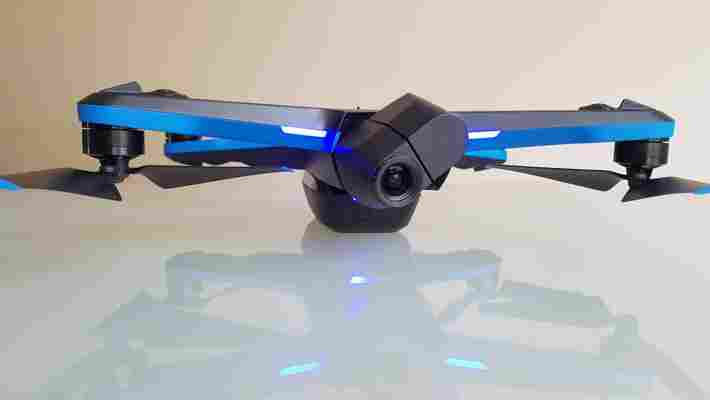
The Skydio 2 autonomous flying camera (some people call it a drone) starts shipping to preorder customers today and that means it’s time to talk about our early impressions.

I got my hands on the 2 a couple of weeks ago and, based on my experience reviewing the Skydio R1 , I couldn’t have been more eager to dive in. The 2 is superior to the R1 in almost every way. It’s smarter, faster, and easier to control than ever.
Skydio’s drones aren’t like anything you’ve seen or flown before. They’re basically autonomous – they navigate entirely on their own with full object avoidance – though the new, smaller model offers several methods of hybrid control. You can direct it with an app on your phone or an optional controller that’s sold separately for $149.
The controller itself is nothing like the cheap remotes I’ve used with other drones. This is built with the kind of quality you’ll find in the Xbox One and PlayStation 4 gamepads — it’s a modified Parrot Anafi running proprietary software.
Credit: Nicole Gray
The first time I launched the 2 I got a giant, silly grin on my face I couldn’t get rid of. It’s just too cool to fly. The only way I can describe the experience of flying in tandem with the 2’s onboard AI is that it’s like using The Force from Star Wars. You can fly it straight at a tree and, as though responding to your thoughts, it’ll gently zig out of the way and then correct back to the course you sent it on. It never feels like the drone is doing it’s own thing, it feels like it knows what you want to do.
Credit: Nicole Gray
You can also purchase a beacon controller ($149) that works like a GPS tracker and remote control. You set the drone to follow the tracker, put it in your pocket or bag, and you can take off running, biking, skiing, driving, or whatever activity you choose and the Skydio 2 will follow you. I didn’t have the opportunity to check out the beacon yet, but I’ll make sure to test it thoroughly for our upcoming full-length review.
The Skydio 2 also has an exceptional 4K60FPS main camera based around Sony’s IMX577 1/2.3” 12.3MP CMOS sensor. In my limited testing it produced beautiful, clear, images with less noise than the R1. Expect in-depth coverage of the 2’s camera features with the full review as well.
Artificial intelligence is the big draw here. The Skydio 2 has six onboard cameras it uses to keep track of its surroundings, an AI processor, and a proprietary mix of machine learning systems that make this thing smarter and safer than any other drone I’ve used. In fact, I’ll go on the record here and say that I’m quite positive the Skydio 2 is my favorite consumer AI product of 2019. I’ve only had about 30 minutes of flight time with it – which felt like 30 seconds – but, barring some unforeseen deal-breaker in my full review, it’s hard to imagine a more impressive and intuitive use of machine learning in a gadget today.
Credit: Nicole Gray
The bottom line is, if you’re interested in the Skydio 2 and you can afford it: I think you should get it. It’s not the best drone for flight hobbyists (this will not scratch your racing drone itch) but it is the best drone for AI enthusiasts and independent filmmakers. You’d spend upwards of 5 to 10 thousand dollars to get just one of the sweeping aerial shots that the Skydio 2 can pull off with ease. This thing is like having a flying film crew, and best of all you can let it do all the work while you make your movie, play with your kids, or pull off sick moves on your bike or skateboard.
The Skydio 2 is an innovative product that improves on the original in every way but one – I miss the larger size and sleek, alien design of the original. The 2 looks a bit more like a ‘regular’ drone. None of that matters once you get it into the air and start filming.
Stay tuned for our full-length review of the Skydio 2 soon. In the meantime you can order yours here on the Skydio website.